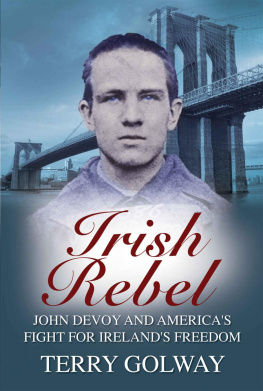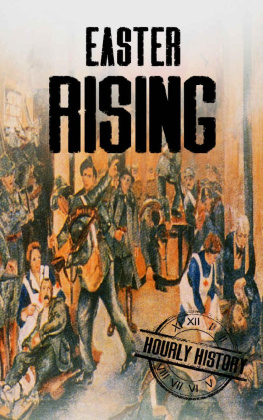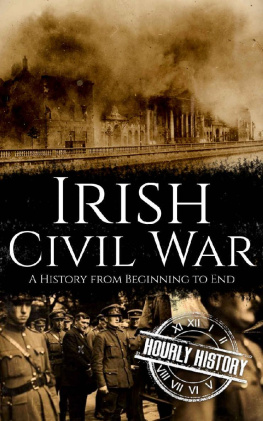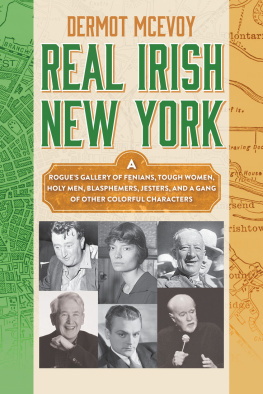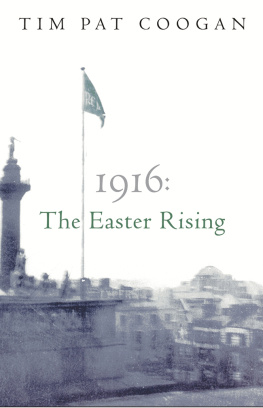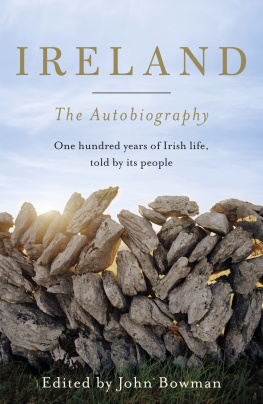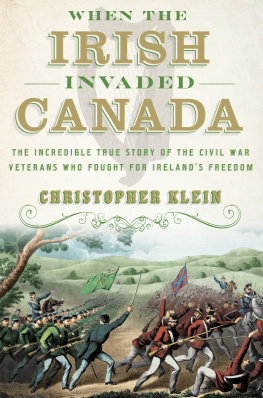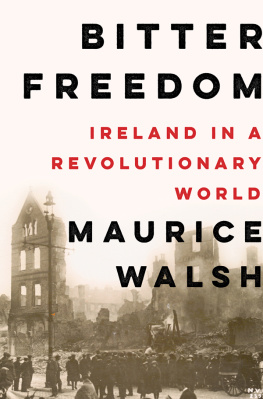IRISH REBEL
This book is for Eileen Duggan
Praise for IRISH REBEL
What a life!
Mike Hudson, Irish Echo
A page-turner an excellent biography. Golways narrative pace is swift and sure. For lovers of biography, here is a terrific one.
Commonweal
In [ Irish Rebel ] youre taken back into the turbulent history of early nineteenth-century Ireland. Theres a short outing with the French Foreign Legion. Theres Devoys attempt to start a rebellion in Ireland, his inevitable escape to the USA. Youll learn, if you didnt know already, that the Irish in America could shape the course of foreign policyespecially with regard to England.
Frank McCourt
Terry Golway has produced a well-researched biography of a man whose life has hitherto been given too little attention.
David Murray, The New York Times Book Review
Patrick Pearse observed that When his biography is written it will be said that [Devoy] was the greatest of the Fenians, and Golway has proved Pearse a prophet with this groundbreaking biography.
Publishers Weekly
Terry Golway is best in illuminating the force of the American Irish community in international politics. A very readable work.
Library Journal
Golway is as adept at detailing Devoys daring as he is at explaining the background of Irish politics. A riveting biography.
Kirkus Reviews
[A] splendid portrayal Golways biography is long overdue.
Robert Taylor, Boston Globe
A wonderful biography The full story is admirably traced by Mr. Golway, including triumphs and fiascoes.
Pete Hamill, The New York Observer
IRISH REBEL
John Devoy and Americas Fight for Irelands Freedom
TERRY GOLWAY

First published in 1999 by St Martins Press
Revised edition published in 2015 by Merrion Press
8 Chapel Lane
Sallins
Co. Kildare
1998 and 2015 Terry Golway
British Library Cataloguing in Publication Data
An entry can be found on request
978-1-78537-025-0 (Paper)
978-1-78537-027-4 (PDF)
978-1-78537-041-0 (Epub)
978-1-78537-042-7 (Mobi)
Library of Congress Cataloging in Publication Data
An entry can be found on request
All rights reserved. Without limiting the rights under copyright reserved alone, no part of this publication may be reproduced, stored in or introduced into a retrieval system, or transmitted, in any form or by any means (electronic, mechanical, photocopying, recording or otherwise) without the prior written permission of both the copyright owner and the above publisher of this book.
Contents
Acknowledgements
T he revised version of this book would not have been possible without the enthusiasm and support of so many people who revere John Devoys memory and who have sought to properly commemorate his tireless devotion to Ireland. My thanks to Seamus Curran, James Durney, Frank MacGabhann, Ger McCarthy, Dan Dennehy, and Livia Szedmina for their efforts to remind people on both sides of the Atlantic of John Devoys extraordinary life. Thanks to Tony Duggan for his hospitality during a family visit to Ireland in 2012.
The book originally was the product of a conversation I had with Angela Carter, the great champion of Irish culture in New York. I had some knowledge of Devoys life and times before my conversation with Angela thanks to long conversations with the late Maurice Burke, S.M.A., and the extraordinary Peter Quinn, novelist, essayist, historian, and Irish-American treasure.
I received wonderful assistance from staffs of the National Library of Ireland, the National Archives of Ireland, Glasnevin Cemetery, the Public Records Office in London, the Municipal Archives of New York, the New York Public Library, the Museum of the City of New York, the Library of Congress, the National Archives in Washington, D.C., the American Irish Historical Association, Catholic University, and the Bureau of Vital Statistics in Atlantic City, N.J.
My original editor, Diane Higgins, was a tremendous source of encouragement and advice.
Thanks to Cormac OMalley, a member of the board of New York Universitys Glucksman Ireland House, for encouraging me to revise this book as the centennial of the Easter Rising approached. Thanks, too, to the 1916 Committee of Glucksman Ireland House and to the Irish Consulate-General in New York, especially Barbara Jones and Anna McGuillicudy. Thanks, also, to Eamonn McKee, a keen observer of Irish America, whom I met when he served in the consulate in New York some years ago.
Conor Graham and Lisa Hyde of Irish Academic Press applied their considerable skills to this revision. My thanks to them for their keen eyes and their enthusiasm for the project.
As always, thanks to my agent, John Wright, and, finally, to my wife, Eileen Duggan, and our children, Kate and Conor.
Terry Golway,
July 2015
List of Plates

C HAPTER O NE
A Land Beyond the Waves
J ohn Devoy was playing poker with four fellow graduates of British jails as they sailed across the Atlantic, bound for New York, in mid-January 1871 aboard the Cunard steamship Cuba. After five years of a meagre prison diet, Devoys short, husky frame showed few signs of deprivation. His hands, however, were tough and calloused from years spent breaking stones.
In return for their early release from prison, Devoy and his playing partners, Irish rebels all, agreed to live anywhere but in the United Kingdom of Great Britain and Ireland. Collectively, they chose New York, the burgeoning capital-in-exile of an Irish Republic that existed only in the minds of John Devoy and his friends. From New York, they would continue the work of bringing revolution and independence to Ireland.
In Devoys pocket was a half-written letter to his long-suffering father, an extraordinary Dublin brewery clerk who lost his small farm in the Famine, his oldest son during a Famine-era cholera epidemic, and his wife when she was just forty-two, leaving him with seven children to rear. William Devoys third child, John, was a stubborn, headstrong, but brilliant young man who was forever at odds with teachers, priests, civil authorities, and sometimes William himself. When he was nineteen, John ran away from home and joined the French Foreign Legion after a row with his father over politics. William Devoy, a gentle and intensely religious man, was helpless in the face of his sons ferocity.
Though William himself once tramped the hills near his familys farm on behalf of Irish political crusades, he feared that the eternally doomed struggle for an independent Irish nation would be his sons ruin. To be sure, John Devoy, now twenty-nine, had long ago succumbed to the call of Irelands ancient martyrs, and for it he had sacrificed job prospects, material advancement, and the woman he loved. Her name was Eliza Kenny, and she was the daughter of a farm family who lived near the old Devoy homestead in Naas, County Kildare. They became engaged just before Devoy was arrested in 1866 while helping to organise a rebellion in Ireland. In a long letter smuggled out of his prison cell, he released Eliza from the engagement, but promised to marry her if she were still single when he was free again. His time of freedom had arrived at last, and Eliza was patiently waiting in her parents little cabin. But there were no half-written letters to Eliza in Devoys pocket as he sailed to his new home. She would wait fifty-four years before hearing from her fiance again.
As the ship drew ever closer to New York on the afternoon of January 20, Devoy and three of his colleagues scrutinised their cards and cast bemused glances at the inscrutable, haggard features of the fifth of their number, Jeremiah ODonovan Rossa. When their journey to freedom began in Liverpool in early January, Rossa told his friends he had never played a game of poker in his life. Now, after a week on the high seas, Rossa was winning hand after hand. But neither Devoy nor the other ex-prisoners, Charles OConnell, John McClure, and Henry Mulleda, were about to complain about Rossas suspicious good fortune. For the first time since the mid-1860s they were free men, free from Britains prisons, and free from the weight of Irelands tortured history. In America, they believed, they would find a clean slate, a future rather than a past, and most of all, a chance to succeed where they had so recently failed.
Next page
